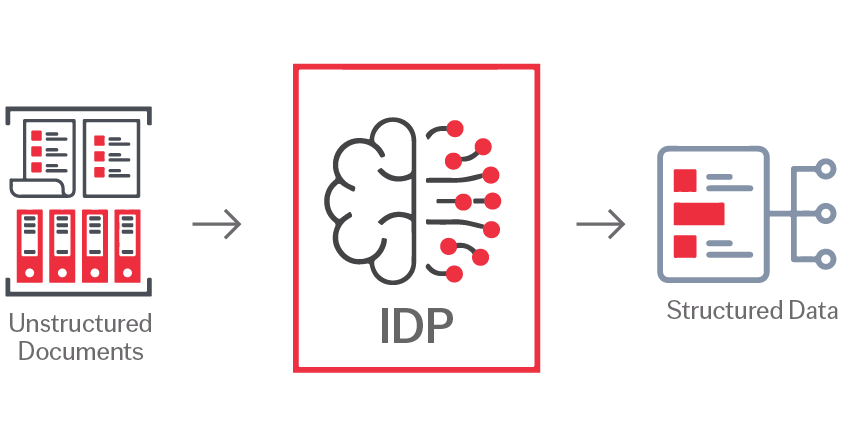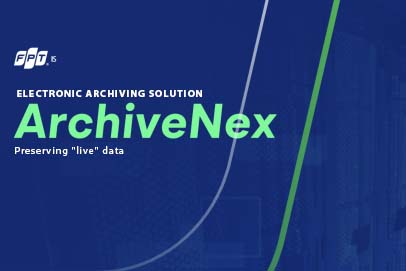How Intelligent Document Processing (IDP) Can Leverage Business Processes?
Since organizations are dealing with a massive amount of data, efficiency and compliance enhancement are becoming their top concern. Intelligent Document Processing has emerged as a powerful tool for businesses to solve complex data challenges, optimize their processes, and deliver considerable returns on investment in a short time.
What is Intelligent Document Processing?
Intelligent Document Processing (IDP) is the technology that automates the collection, classification, extraction, evaluation, and processing of data from a range of formats (including structured, semi-structured, and unstructured data).
This cutting-edge solution leverages the capabilities of a series of advanced technologies, including Artificial Intelligence (AI), Natural Language Processing (NLP), Computer Vision, Machine Learning (ML), and Optical Character Recognition (OCR) to handle complex data and facilitate comprehensive processes.
Why do businesses need to embark on IDP to transform processes?
Opportunities are hidden in untapped data
Data is a key pillar for any organization to understand the performance of a business model, grasp the market trends, and measure the company’s development and employees’ effectiveness. However, more than 80% of organization data is encrypted in an unstructured or semi-structured format, such as business documents, emails, images, signatures, blueprints, or PDF documents. This complicated data structure requires more intelligent processing.
Hence, IDP’s ability to handle large volumes of complex data with greater accuracy is ideal for businesses to reveal a comprehensive, accurate, and in-depth picture of data. By unveiling the true value of hidden data, businesses can capture customer insights to improve personalized products suitable for the customer’s needs. Besides, valuable data can be used to optimize operations and performance, generate new insights about the market and customers, and create new business opportunities.
- IDP can automatically collect data from various sources and incorporate Natural Language Processing (NLP) and Machine Learning (ML) to dig deep and extract valuable information from the data, providing more accurate insights for businesses.
- Automatically store and integrate relevant into the centralized database, allowing the businesses to take advantage of this data to develop strategies for improving products/services suitable for potential customers.
Customer’s expectations for businesses are increasingly high
Customers have higher expectations than ever before. PwC states that up to 73% of customers report a positive experience that highly influences their purchasing decisions. However, businesses have to deal with a tremendous amount of data manually, causing longer processing times, waiting lines, and an unpleasant customer experience.
With the ability to process and manage large volumes of data accurately and efficiently, IDP allows businesses to avoid cumbersome paperwork and limit errors, resulting in faster processing time and superior experience for customers.
- IDP can handle a massive pool of data, evaluate data, and transfer data to relevant departments, enabling organizations to provide customers with faster service, such as opening cards and reviewing loan approval in the banking industry.
- Understand data context and meaning with the use of Natural Language Processing to offer personalized recommendations and experiences for customers.
Efficiency is a top priority
Enhancing efficiency is the top strategic priority, with organizations making an effort to boost productivity at every stage.
However, manual processes such as data entry, data classification, and storage often cause organizations to waste tremendous time and resources, leading to low productivity, and increased operational costs.
By creating seamless data processing with maximum speed and accuracy, the IDP solution provides faster processing time and eliminates the need for human intervention, thus bringing optimal operational efficiency and limiting disruptions in the operation.
Regulatory compliance is sometimes hard to achieve with the massive document volumes
Organizations often have to deal with several regulations and go through a series of processes, requiring verification of data from numerous documents and papers.
Fines and penalties for non-compliance can be imposed, causing financial losses for the businesses. AI Business’s report shows that more than $450 billion worth of penalties for non-compliance have been issued. However, as these processes are often performed manually, they are a common cause of why organizations fall afoul of regulations.
With the adoption of IDP, businesses are capable of staying up-to-date with the latest compliance requirements, flagging potential violations, and adjusting their operations accordingly.
- IDP is capable of extracting relevant data from all kinds of documents and analyzing vast amounts of unstructured regulatory content/
- Automatically extracting key terms in regulatory documents, identifying and flagging potential risks.
- IDP can combine with AI algorithms to compare and validate data, ensuring businesses enhance their compliance efforts.
Top-most IDP use cases across industries
IDP has found applications in various industries, but some areas can fully unlock the potential of IDP to process and manage large volumes of data accurately and efficiently.
Finance and Banking
The Finance and Banking industry is a heavy user of paper-based processes, from customer documents, input information, withdrawals, money transfers, loans, or account opening and loan registration, leading to inefficient, slow, and costly operations.
With the support from IDP solutions, businesses can:
- Extract and process customer information from various sources, and verify data for an effective Know Your Customer (KYC) process.
- Extract the relevant information from bank statements and validate it against salary slips and expense bills for loan decisions.
- Reconcile and confirm account statements and cash books, integrating with AI algorithms to detect potential fraud for timely handling.
Insurance
Insurance requires a large amount of manual paperwork, from handwriting, transaction reports, and underwriting/claims handling guidelines. Each of the media can exist in various formats like structured, semi-structured, and unstructured. This puts the insurance industry under tremendous pressure to make use of data sources and open up new business opportunities.
With the help of IDP, insurers can streamline business processes, enhance fraud protection, and accelerate time-to-market for innovative and valuable products/services.
- IDP can automatically collect documents, verify information for FNOL (First Notice of Loss – the first step of claims processing), extract data from paper claim submissions, classify data, and enter it into the system without human intervention.
- Scan data from multiple sources, including previous losses, health, and financial data for insurers to examine risk concerning underwriting and pricing.
- Automatically scan through the scope and terms of the policy, and send out automated policy renewal alerts to policyholders.
Logistics
Logistics is a complex industry that includes a lot of paperwork such as invoices, inventory lists, fuel bills, insurance documents, etc. Hence, the implementation of IDP can help organizations reduce time and effort in handling manual work, resulting in maximum efficiency and performance.
- Process, analyze, and extract large volumes of shipping documents.
- Extract data from packaging lists, compare them with order record data, and integrate it into a centralized database.
- Extract data from invoices and save them as Excel sheets or upload them to a centralized database for forecasts or business plans.
Manufacturing
The manufacturing industry often deals with complex order management and manual invoice processing, resulting in costly and inefficient operations.
With its strength to process complex data with greater accuracy and speed, IDP helps manufacturing achieve improved productivity, enhanced operating efficiency, and reduced costs.
- IDP can automatically scan and capture data from inspection reports, product specifications, and test results, allowing manufacturers to handle quality issues quickly.
- Extract data from hard-copy documents, and classify them based on prescribed quality and assurance procedures so that the information remains cohesive and accessible
- Automatically collect data from purchase orders in multiple formats – fax, and email, and then integrate this data into Enterprise Resource Planning (ERP) systems according to set rules by the administrator.
Government
The government has perhaps the most varied kinds of documents, including job applications, tax forms, social security documents, etc., and managing them can be challenging. Therefore, IDP acts as an effective assistant to solve the urgent needs of the government.
- IDP automatically extracts, analyzes, and processes documents, correspondence, complaints, court records, legal documents, etc., and transfers them to appropriate departments for approvals or rejections
- Extract and analyze the highlighting information from the results of public and government surveys and the annual report results to create a consolidated report
Benefits of transforming to Intelligent Document Processing
IDP brings numerous benefits to the business world which are significantly transforming how organizations process data.
- Process complex documents: Unlike traditional document processing, IDP can transform semi-structured and unstructured data from various documents into usable formats that can be integrated into day-to-day business processes.
- Improve process efficiency: By automatically performing manual processes and eliminating the need for human intervention, IDP can significantly enhance processing time and facilitate a seamless workflow. This technology can reduce processing time by up to 85% and increase data extraction speed by up to 10 times.
- Enhance data accuracy: IDP can navigate through complex structures of documents with maximum accuracy. Implementing IDP can improve data accuracy by 99.9% compared to traditionally manual processes.
- Reduce costs: By minimizing the costs associated with manual processes, human intervention, and errors, along with fast and accurate data processing, IDP helps organizations to achieve optimized operational costs.
- Increase compliance: IDP enables greater compliance by reducing the chances of human errors and ensuring data is accurate, consistent, and up-to-date.
- Boost customer experience: With improved processing time and enhanced data quality, IDP accelerates businesses to provide faster response times and more accurate information for customers, leading to enhanced customer satisfaction.
Final thoughts
According to Grand View Research, the global IDP market is forecasted to reach USD 5.2 billion by 2027 and is expected to grow at a compound annual growth rate (CAGR) of 37.5% from 2022 to 2027. This emphasizes the ever-growing potential of IDP in the coming years, facilitating businesses to adopt this cutting-edge solution to leverage value and competitiveness in the market. IDP is not only crucial for the financial – banking, logistics, manufacturing, and government agencies but it can be effectively applied in different industries for transformative operations.
Exclusive article by FPT IS Technology Expert
Bui Dinh Giap
akaBot CEO
FPT Information System Company.














